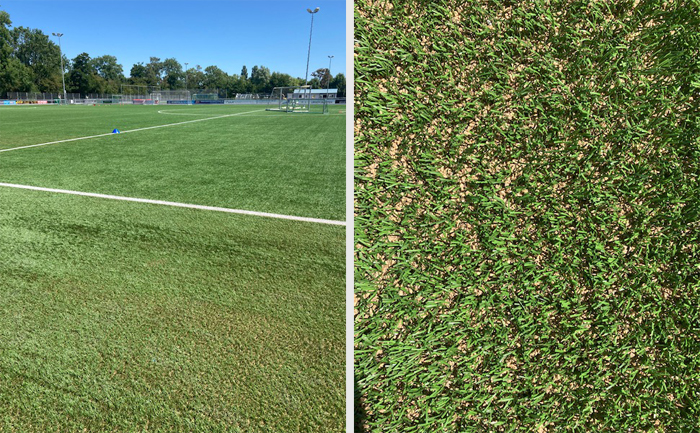Artificial turf systems and especially synthetic infills have raised questions about their environmental impact in recent years. Amorim Sports addresses these issues with innovative and sustainable organic infills.
Nature as the starting point for a sustainable future
Cork is a 100% natural, recyclable, renewable raw material obtained from the cork oak tree (Quercus Suber L.), mainly found in Southern Mediterranean countries and North Africa, with an average lifetime of 200 years. Portugal is the leading cork-producing country, responsible for over 50% of total European cork production.

Amorim Sports’ infills do not release microplastics into the ecosystem and pollute nature.
Image: Amorim Sports
By promoting cyclical extraction of cork, without damaging the cork oak trees, Corticeira Amorim’s activity ensures the viability of the cork oak forest, which is a natural and renewable resource that offers numerous environmental, economic and social benefits. Studies indicate that for each ton of cork produced, the cork oak forest can sequester up to 73 tons of CO2, and thus helps to reduce the Global Warming Potential.
As eco-efficient materials, with an entire life cycle, in which even the tiniest form of waste (e.g. cork dust) are used to cogenerate electricity, products with cork minimize greenhouse gases and reducing our carbon footprint.
Unlike many synthetic infills, Amorim Sports’ infills do not release microplastics into the ecosystem and pollute nature. Thus, it contributes to reducing the spread of microplastics in the environment.
Organic infill – mixing cork with olive pit
The Organic infill range is one of the new infill granules from this development and provides an optimal solution for the above-mentioned topics. As a mixture of cork and olive pit, synthetic cross-linking can be completely dispensed. Both cork and the olive pit components originate from a sustainable and natural recycling economy. Both have their background from the food industry and leave no doubt as to their harmlessness to the environment and humans.
The combination of cork and olive pits creates interesting sport-functional properties. While the infill itself, in contrast to pure sand-filled systems, keeps the turf system in optimal playing properties over the long term, the infill layer ensures a more optimal gaming experience for the player. While the olive core component ensures the necessary stability in the system, the cork component contributes to the reduction of force and the playing comfort thanks to its natural elasticity. The size distribution, as well as the infill shape, is optimized to minimize the discharge from the system and the maintenance effort.
Organic infills can be selected in different versions 201, 202 and 203 with different elasticity according to the cork content.
In contrast to other natural infill materials, Organic range is weather-resistant, rot-resistant and ensures constant playing conditions over a long period.
Organic 202 was the infill chosen for the Schagen United pitch, installed last year. As a pilot test, the players’ feedback was very positive, with entire satisfaction about performance and safety.
(STADIAWORLD, 30.08.2022)
Homepage: Amorim Sports